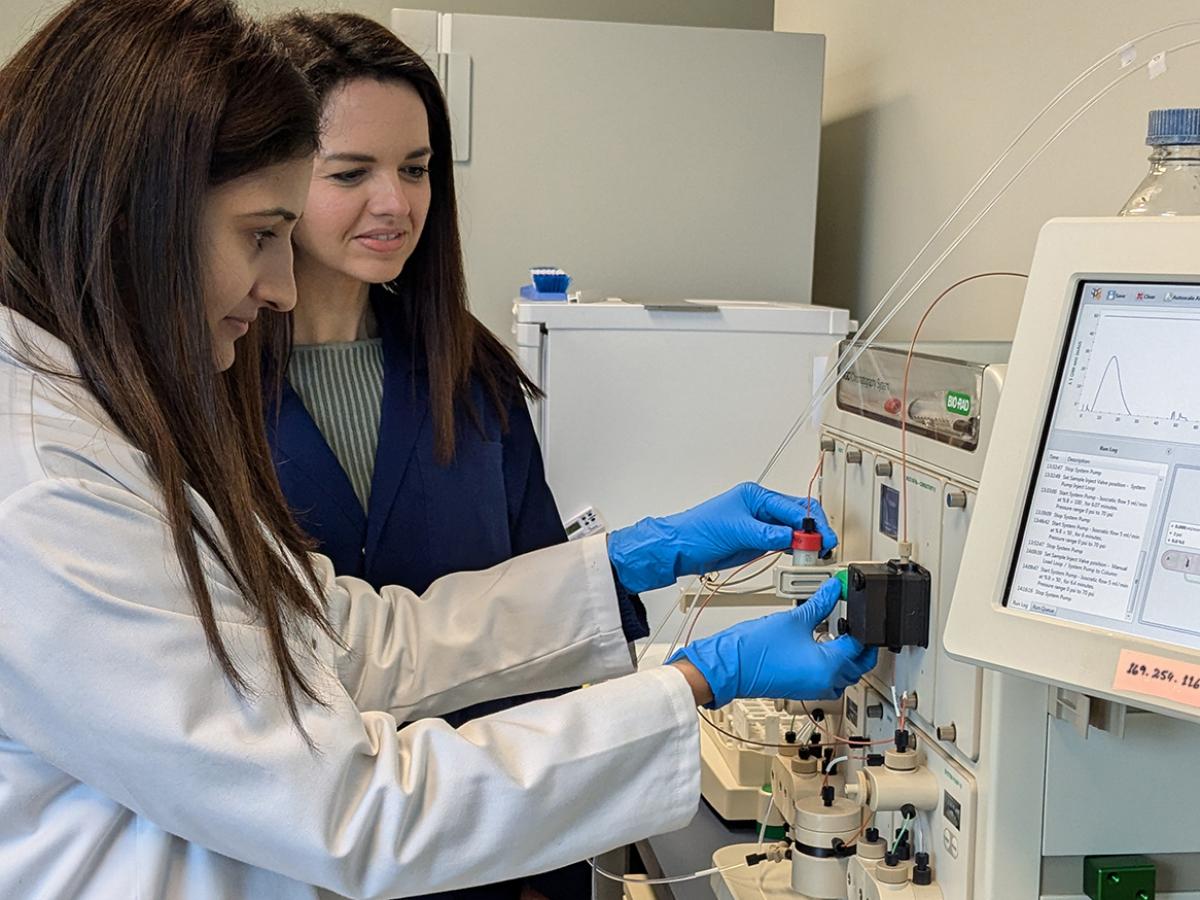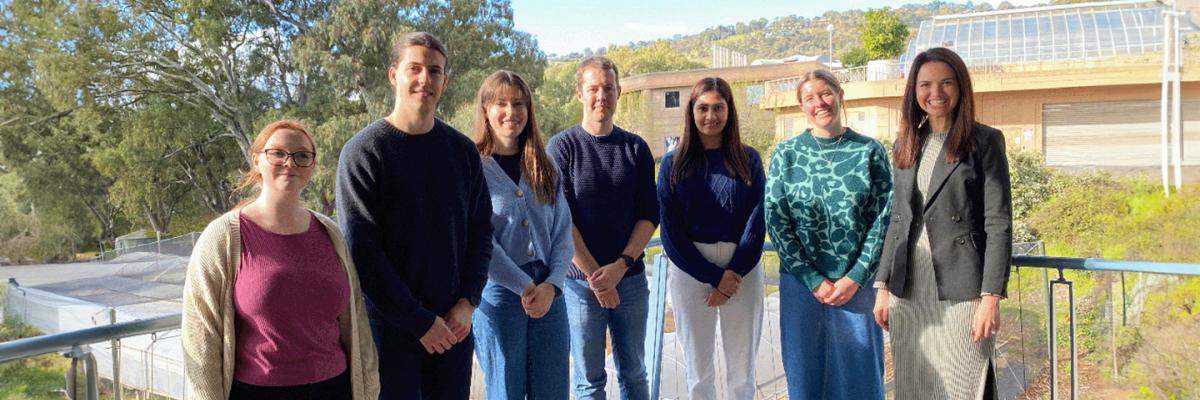Herbicide and Antimicrobial Innovation Laboratory

We apply our expertise and skills in protein biochemistry, plant science, chemistry and microbiology to make breakthrough discoveries in antimicrobial and herbicide research such as turning failed antibiotics into a game-changing weed killer to help farmers improve crop yields and quality.
-
About us
Our research group uses a highly targeted approach to tackle antimicrobial and herbicide resistance. Firstly, we use our biochemical expertise in molecular pathways exclusively found in plants and microbes to specifically target them for herbicide and antimicrobial discovery, respectively. This targeted approach minimises potential toxicity and off-target effects. Secondly, we exploit biophysical interactions between herbicides/antimicrobials and targets, in combination with using computational approaches, to identify mutations that result in resistance. We use this knowledge for chemically modifying herbicides and antimicrobials to bypass resistance mechanisms. Lastly, we exploit new herbicide and antimicrobial resistance mechanisms, an understanding of which could lead to the development of new monitoring and circumvention tools.
We collaborate with national and international researchers in academia and industry to support sustainable agricultural and health practices.
-
Research impacts and expertise
Our research addresses key challenges faced by the agricultural and health industries.
We have made significant advances in:
- the biochemistry of biosynthesis pathways in plants and microbes, in particular related to amino acid production;
- the chemical synthesis of new herbicidal and antimicrobial compounds;
- the biological characterisation of herbicidal and antimicrobial compounds in vitro and in vivo; and
- probing new resistance mechanisms.
We have technical skills and expertise related to herbicide and antimicrobial target isolation, characterisation and inhibition; measuring the potency of new compounds in vitro and in vivo; computational and experimental tools to determine the 3D structures of herbicide and antimicrobial targets, and measure herbicide/antimicrobial-target interactions; assays to assess resistance mechanisms; and chemical methods for the synthesis of new compounds.
Our research projects include:
- Towards novel herbicide modes of action by inhibiting lysine biosynthesis in plants – Discovery of the first inhibitors of lysine biosynthesis with herbicidal activity. This discovery demonstrates that inhibition of lysine biosynthesis represents a novel herbicide mode of action.
- A dual-target herbicidal inhibitor of lysine biosynthesis – First report of a dual-target herbicidal compound, i.e., a compound that inhibits two targets simultaneously to impede the generation of resistance in weeds. Multi-target compounds allow us to progress the herbicide field beyond the ‘one target–one herbicide’ paradigm.
- Repurposed inhibitor of bacterial dihydrodipicolinate reductase exhibits effective herbicidal activity – Discovery that we can modify the structure of failed antibiotics and turn them into herbicides that are effective against weeds. This study highlights an innovative strategy to fast-track the development of herbicides.
- Shapeshifting bullvalene-linked vancomycin dimers as effective antibiotics against multidrug-resistant gram-positive bacteria; Selective inhibition of Biotin Protein Ligase from Staphylococcus aureus* – Determination of >30 protein crystal structures of unexplored herbicide and antibiotic targets. This has allowed the discovery of herbicidal and antimicrobial compounds with high potency and specificity.
-
Collaboration
Based at the Waite Research Institute (WRI), the Herbicide and Antimicrobial Innovation Laboratory has been generously supported by the Australian Research Council (FT230100203, IC220100050, DP220101901, DE190100806) and various grants (NHMRC, Australian Academy of Science, Hermon Slade Foundation, South Australian Potato Industry Trust, Yitpi Foundation) awarded to Dr Tatiana Soares da Costa.
The Waite Research Institute stimulates and supports research and innovation across the University of Adelaide and its partners that builds capacity for Australia’s agriculture, food, and wine sectors.
-
State-of-the-art facilities and partners
We access the University of Adelaide’s state-of-the-art facilities located at the Waite campus within the School of Agriculture, Food and Wine.
Our co-located partners include:
- The Australian Wine Research Institute
- AGRF
- Metabolomics Australia, University of Melbourne | A Commonwealth Government Initiative Available to All Life Science Researchers
- Commonwealth Scientific and Industrial Research Organisation, Australian Government - CSIRO
- SARDI - South Australian Research and Development Institute - PIRSA
-
Our research
- Dr Tatiana Soares da Costa, lead researcher
- Dr Andrew Barrow, postdoctoral researcher
- Dr Emily Mackie, postdoctoral researcher
- Daniel Hawkins, PhD student
- Sreshtha Malik, PhD student
- Ryan McClean, PhD student
- Mirrin McKay, PhD student
- Eloise Hart, Honours student

Engage with us
To discuss an industry partnership, consultation, and for general research enquiries, please contact Dr Tatiana Soares da Costa, Head of the Herbicide and Antimicrobial Innovation Laboratory.
Recruiting research students
We are recruiting Honours, Masters and PhD students to work on various projects spanning biochemistry, chemistry, microbiology, molecular biology and plant science. Please contact Dr Tatiana Soares da Costa directly with an expression of interest.

Members of the Soares da Costa research group (from left to right). Eloise Hart (Honours student), Ryan McClean (PhD student), Dr Emily Mackie (postdoctoral researcher), Dr Andrew Barrow (postdoctoral researcher), Sreshtha Malik (PhD student), Mirrin McKay (PhD student) and Dr Tatiana Soares da Costa (Laboratory Head).
